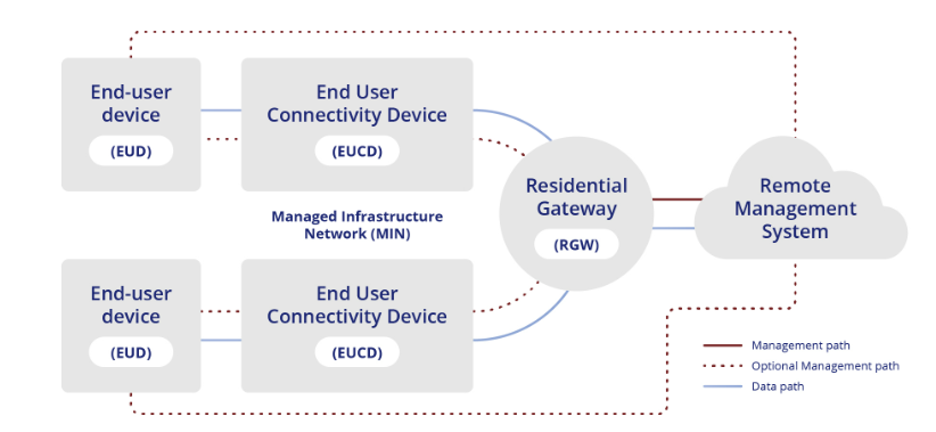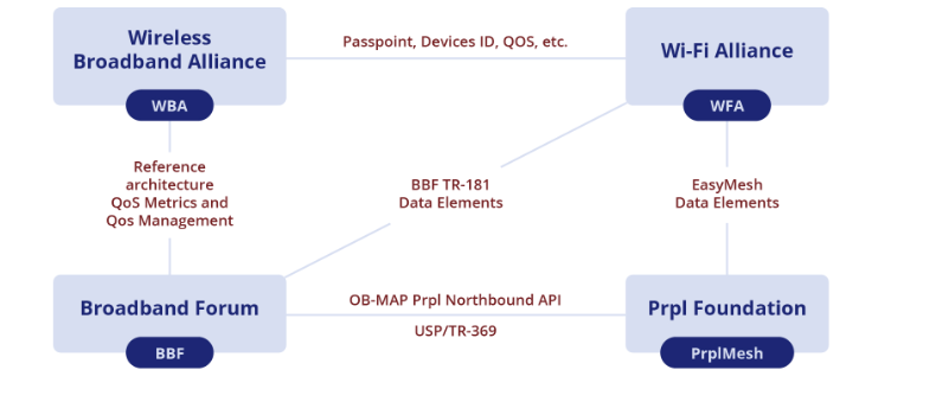For many years IEEE 802.11 was the basis for evolving WiFi standards. Then the nonprofit Wi-Fi Alliance (WFA) began working alongside IEEE to develop certification programs for these new WiFi generations. WFA and the Wireless Broadband Alliance (WBA) have also worked closely together on other key WiFi technologies, including Passpoint (Hotspot 2.0).
Joint work across WiFi standards groups has recently accelerated, with Broadband Forum and the prpl Foundation also taking an active role. These efforts synergistically reinforce each other, collectively accelerating the reach of the WiFi standards ecosystem.
A recent focus area is operator management toward enabling carrier-grade WiFi, an important area for DZS service provider and enterprise customers. As these WiFi standards become more pervasive, DZS has staked out a leadership role in bringing these efforts to fruition, both by supporting standards development and by adopting standards in DZS products to assist operators in building this emerging, vendor-neutral, standards-based ecosystem.
Broadband Forum and Wireless Broadband Alliance
Broadband Forum has been instrumental in developing Connected Home standards, including cloud or remote management of WiFi. First, it developed the ubiquitous TR-69 standard, and more recently the TR-369 User Services Platform (USP) standard. Broadband Forum also defines the TR-181 data model used by TR-69 and TR-369, which has an extensive representation of WiFi objects and parameters. Broadband Forum also defines the TR-124 residential gateway requirements, the Broadband Forum TR-398 WiFi performance test plan, and now the WT-488 specification on home architecture (see Figure 1) and the WT-492 specification on smart gateways.
The Wireless Broadband Alliance (WBA) is another leader in WiFi standards, including Passpoint and OpenRoaming, as well as IoT, 5G, WiFi 6/6E, WiFi sensing, Captive Portal, Device ID, in-home WiFi guidelines, and in-home multi-Access Point (AP) trials. The WBA Operator Managed WiFi Reference Architecture project, has recently written “Operator Managed Wi-Fi Reference Architecture and Requirements” with a reference in-home WiFi network architecture that covers both single wireless gateway and multi-AP in-home WiFi solutions. Other WBA programs also include access networks metrics and Quality of Service (QoS) Management trials.
 Figure 1. Simplified BBF WT-488 architecture. The EUCD can be a WiFi Access Point, and the EUD can be a WiFi station.
Figure 1. Simplified BBF WT-488 architecture. The EUCD can be a WiFi Access Point, and the EUD can be a WiFi station.
Recent joint Broadband Forum and WBA meetings have discussed WiFi reference architectures, WiFi performance testing and other topics. Broadband Forum is now completing WT-488, Operator-Managed End User Network Architecture and Requirements, which are composed of a mix of diverse in-home technologies including WiFi and wireline (Ethernet/MoCA/G.hn) communication. This effort overlaps with the WBA Operator Managed WiFi Reference Architecture project, and these efforts are being aligned.
Joint WBA and Broadband Forum discussions also include data modeling for WiFi with Broadband Forum TR-181, and BBF.398 Grade WiFi, which is the industry’s leading WiFi performance testing and certification program. QoS is a further area of overlap, with the Broadband Forum Quality of Experience Delivered (QED) initiative being shared with WBA.
Wi-Fi Alliance and Broadband Forum
The Wi-Fi Alliance (WFA) defines myriad important specifications and certifications for WiFi equipment. For example, WFA Wi-Fi CERTIFIED Data Elements™ defines a standardized set of the most important capabilities and performance parameters for WiFi network management, such as use of bandwidth, signal strength measurements and free airtime.
Data Elements R2.1 now includes remote configuration, including writable parameters and commands. Due to recent joint work with Broadband Forum, WiFi Data Elements R2.1 with remote configuration is now completely defined and included in the Broadband Forum TR-181 Device:2.15, the data model for TR-69 and TR-369. Further, certification testing of WiFi Data Elements remote configuration by the WFA is using Broadband Forum TR-369/USP. Going forward, WiFi Data Elements are expected to be further included in TR-181, with Broadband Forum requirements for Data Elements to be input to WFA.
Another joint area for Broadband Forum and WFA is Wi-Fi CERTIFIED QoS Management™ as defined by WFA and 5G QoS assignments as defined by the Broadband Forum and the 3rd Generation Partnership Project (3GPP). Figure 2 illustrates the current wealth of joint WiFi standards.
 Figure 2. Joint WiFi standards.
Figure 2. Joint WiFi standards.
WBA and WFA
The WBA and WFA have been working together for many years on various projects, particularly on Wi-Fi CERTIFIED Passpoint®, which is used by WBA in OpenRoaming and Hotspot. Recent joint WFA and WBA meetings have further advanced the technical specifications of Passpoint for OpenRoaming.
WBA has recently written a whitepaper “Wi-Fi Device Identification—A Way Through MAC Randomization,” which overlaps with WFA work on device identification. WFA Wi-Fi QoS Management is also of current joint interest to the WBA and WFA.
prpl Foundation, WFA, and Broadband Forum
The prpl Foundation develops advanced open-source software for WiFi systems. prplOS, formerly named prplWRT, is a comprehensive enterprise-grade software framework for WiFi Access Point (AP) devices, including residential deployments. prplMesh is an open-source, carrier-grade and certifiable implementation of the WFA Wi-Fi CERTIFIED EasyMesh™ specification for multi-AP mesh networks. prpl is true open source, with a public development process and no single controlling company.
prplMesh works with WFA specifications of WiFi EasyMesh, and WiFi EasyMesh certification tests are regularly run on prplMesh to ensure interoperability. prplMesh also incorporates WFA Wi-Fi Data Elements.
There is extensive joint work between Broadband Forum and the prpl Foundation, particularly on the prplMesh Northbound API. The Broadband Forum Open Broadband Multi-AP (OB-MAP) project works jointly with prpl toward developing the data model for prplMesh. The prplMesh Northbound API incorporates the WiFi data model in Broadband Forum TR-181 as well as WFA WiFi Data Elements. prplMesh is also working with Broadband Forum to define and use the internal services interface definition for communications within a device using Broadband Forum TR-369/USP as implemented by the Broadband Forum Open Broadband USP Agent (OB-USPA) opensource.
DZS is an open standards company
DZS is an open standards company that has long supported global industry standards for WiFi and other technologies. DZS is directly involved with supporting and having leadership roles in all the above described joint WiFi efforts in Broadband Forum, WFA, WBA, and prpl Foundation.
DZS is fully committed to embracing open standards across all our products and solutions (e.g., DZS Cloud, DZS CloudCheck, DZS Xperience) to ensure their future-proof interoperability with other software and equipment—for maximum operator benefit in managing carrier-grade WiFi.
For example, DZS today is the only vendor to offer service creation, network orchestration and automation (DZS Xtreme) combined with in-home service assurance and in-home WiFi experience management (DZS CloudCheck) across multi-vendor networks. No other vendor offers this broad range of open, end-to-end, multi-vendor capabilities that can “speak the language” of heterogeneous vendors’ Optical Networking Terminals (ONTs) and Optical Line Terminals (OLTs), as well as more than 150 devices within subscribers’ homes.
It is this unequaled level of support for open standards that uniquely positions DZS to support service providers to transform into “experience providers” that deliver services leveraging best-in-class hardware and software to create the best experiences, versus the constraints of a single-vendor’s environment.
Contact DZS to discover how we can enable your company’s transformation to an experience provider offering innovative, differentiating solutions and services while achieving improved operational efficiencies and increased revenue.



 '
'